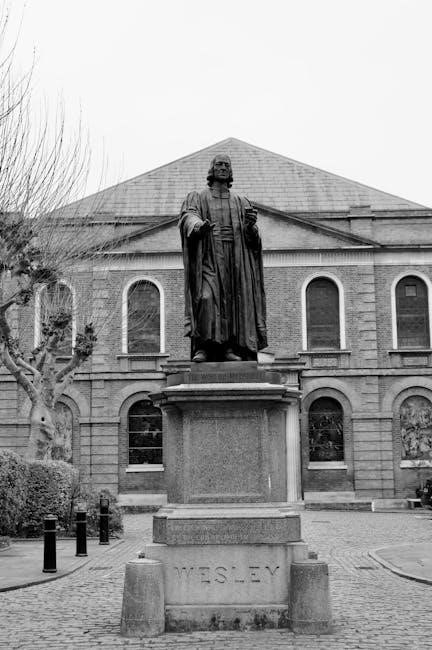The Book of Discipline is the official guide for United Methodist Church governance, outlining doctrine, ethics, and polity. The 2024 edition is available as a downloadable PDF, ensuring accessibility for clergy and laity alike. It serves as the foundational document for church operations, reflecting the denomination’s theological principles and organizational structure.
Overview of the Book of Discipline
The Book of Discipline is the official guide for the United Methodist Church, detailing its governance, doctrine, and ethical standards. Available as a downloadable PDF, it provides comprehensive insights into the church’s structure and polity. This essential resource outlines the rules, procedures, and theological foundations that shape the denomination’s practices. Regularly updated, the Book of Discipline reflects the evolving needs and decisions of the church, ensuring clarity and consistency in its mission and operations. It serves as a vital tool for clergy, laity, and decision-making bodies within the United Methodist Church.
Its Role in Governing the Church
The Book of Discipline serves as the governing document of the United Methodist Church, outlining its laws, bylaws, and ethical standards. It provides a framework for decision-making and ensures consistency in church practices. The book acts as a reference for resolving disputes and guiding church operations. Regularly updated to address contemporary issues, it maintains the denomination’s unity and integrity. By adhering to its principles, both clergy and laity can fulfill their roles effectively within the church’s structure.
History and Development of the Book of Discipline
The Book of Discipline traces its roots to John Wesley’s Methodist movement, with the first edition published in 1784. It has evolved over centuries to address changing societal and theological needs, reflecting the church’s growth and adaptation. The 2024 edition continues this legacy, incorporating updates to maintain relevance while preserving foundational principles established by Wesley, such as the concept of a “movable church” and connectional polity.
Historical Background and Origins
The Book of Discipline traces its origins to John Wesley’s Methodist movement in the 18th century. The first edition, published in 1784, established the rules and doctrines for the newly formed Methodist Episcopal Church. Over time, the book evolved to reflect the church’s growth and societal changes. The 2024 edition continues this tradition, blending historical principles with contemporary relevance. Rooted in Wesleyan theology, it has served as the governing document for the United Methodist Church, guiding its mission and polity for over two centuries. Its development reflects the church’s commitment to connectionalism and shared governance.
Key Milestones in Its Evolution
The Book of Discipline has undergone significant transformations since its inception. The first edition, published in 1784, established foundational guidelines for the Methodist Episcopal Church. Over the centuries, revisions reflected societal changes and theological developments. A major milestone occurred in 1968 with the merger forming the United Methodist Church, prompting a unified Book of Discipline. The 2024 edition introduced notable updates, including Paragraph 2553, which addresses church disaffiliation processes. These milestones highlight the document’s adaptability while maintaining its core purpose of guiding the church’s doctrine, polity, and mission.

Structure and Content of the Book of Discipline
The Book of Discipline is organized into sections covering doctrine, church governance, and pastoral practices. It includes foundational principles, ethical guidelines, and operational policies, ensuring clarity and consistency in church operations. The document is regularly updated to address contemporary issues, reflecting the church’s commitment to adapt while maintaining its theological roots. This structured approach ensures that both clergy and laity can access and understand the governing principles of the United Methodist Church effectively.
Organization and Key Sections
The Book of Discipline is divided into sections that address doctrine, church governance, and pastoral practices. It includes foundational principles, ethical guidelines, and operational policies. The document is organized to provide clarity on matters such as church leadership, worship, and membership. Key sections cover theological foundations, polity, and practical applications for clergy and laity. Regular updates ensure relevance to contemporary issues, making it a comprehensive guide for understanding the church’s mission and structure. Its organized format allows for easy navigation, ensuring accessibility for all members seeking to understand the church’s governance and beliefs.
Core Doctrines and Polity
The Book of Discipline outlines the United Methodist Church’s core doctrines, emphasizing grace, repentance, and Christian perfection. It upholds the traditional view of marriage as between a man and a woman, reflecting ongoing debates within the church. The document also addresses polity, providing guidelines for church governance, clergy roles, and congregational life. It serves as a theological and operational framework, ensuring unity in belief and practice across the denomination. Controversies, such as LGBTQ+ ordination and same-sex marriage, highlight the tension between doctrine and evolving societal norms, making the Book of Discipline a focal point for discussion and decision-making.

Theological Foundations and Doctrines
The United Methodist Church’s Book of Discipline rooted in Wesleyan theology, emphasizing grace, repentance, and Christian perfection. It guides doctrine, ensuring unity in belief and practice across the denomination.
Key Theological Principles
The United Methodist Church’s Book of Discipline is grounded in Wesleyan theology, emphasizing prevenient, justifying, and sanctifying grace. It affirms the authority of Scripture, the primacy of love, and the pursuit of holiness. Core principles include the divine nature of Christ, the transformative power of the Holy Spirit, and the importance of faith and works. The doctrine of Christian perfection, or entire sanctification, encourages believers to strive for a life of complete devotion to God. These principles guide the church’s mission, ethics, and practices, fostering a balanced approach to personal and social holiness.
Christian Perfection and Holiness
The Book of Discipline underscores Christian perfection, a cornerstone of Methodist theology, emphasizing entire sanctification and holiness of heart. It teaches that believers can achieve a state of perfect love for God and neighbor through faith and grace. This doctrine, rooted in Wesley’s teachings, encourages a life of moral purity, compassion, and devotion. The pursuit of holiness is not just individual but communal, guiding the church’s mission to transform lives and society. The Discipline reflects this commitment, inspiring Methodists to strive for a life fully surrendered to God’s will and empowered by the Holy Spirit.

Recent Updates and Amendments
The 2024 Book of Discipline introduced significant updates, including Paragraph 2553, which provides a formal process for church disaffiliation. This change addresses ongoing theological and structural tensions within the denomination, particularly around LGBTQ+ inclusion and traditionalist vs. progressive viewpoints. The amendments aim to offer clarity and pathways for congregations navigating these challenges while maintaining the church’s foundational principles and governance structure.
2024 Edition Changes and Relevance
The 2024 Book of Discipline introduced significant updates, particularly Paragraph 2553, which outlines a formal process for church disaffiliation. This amendment addresses the growing tensions within the denomination, especially regarding LGBTQ+ inclusion and traditionalist versus progressive viewpoints. The changes aim to provide clarity and structured pathways for congregations navigating these challenges. Additionally, the 2024 edition includes revisions to policies on ordination and marriage, reflecting ongoing debates within the church. The updates underscore the evolving nature of the Book of Discipline, ensuring it remains a relevant guide for governance and ministry in a changing spiritual landscape. The PDF format enhances accessibility for members worldwide.
Paragraph 2553 and Church Disaffiliation
Paragraph 2553, introduced in the 2024 Book of Discipline, provides a formal process for churches to disaffiliate from the United Methodist Church. This amendment addresses the growing tensions over theological and social issues, particularly LGBTQ+ inclusion. The paragraph outlines specific procedures, including congregational votes and financial obligations, to ensure an orderly separation. While some view this as a necessary step for unity, others see it as a reflection of deep divisions within the denomination. The inclusion of Paragraph 2553 highlights the challenges of maintaining cohesion in a diverse and evolving church. Its implementation is expected to shape the future of UMC congregations.
Controversies and Debates Surrounding the Book of Discipline
The Book of Discipline sparks debates over LGBTQ+ policies, ordination, and marriage, causing division within the church and prompting some congregations to consider disaffiliation.
LGBTQ+ Issues and Church Policy
LGBTQ+ issues remain a contentious topic within the United Methodist Church, with the Book of Discipline prohibiting same-sex marriage and the ordination of gay clergy. This stance has led to widespread debate and division, prompting calls for reform and greater inclusivity. Some churches and members advocate for a more progressive approach, while others uphold the traditional view outlined in the Discipline. The controversy has resulted in heated discussions at General Conferences and has been a central issue in recent disaffiliations, as congregations struggle to reconcile their beliefs with church policies.

Ordination of Gay Clergy and Same-Sex Marriage
The Book of Discipline explicitly prohibits the ordination of “self-avowed practicing homosexuals” and the performance of same-sex weddings by United Methodist clergy. These policies have sparked significant controversy and calls for change, with many advocating for full inclusion of LGBTQ+ individuals in church leadership and sacramental life. The debate has led to proposed amendments and ongoing discussions within the church, reflecting broader societal shifts toward greater acceptance of LGBTQ+ rights. The current policies remain a focal point in the church’s struggle to balance tradition with modern values and inclusivity.
Accessing the Book of Discipline in PDF Format
The 2024 Book of Discipline is available as a downloadable PDF, offering convenient access to church governance, doctrine, and polity. Electronic formats ensure wide accessibility for clergy and laity.
Availability and Download Options
The United Methodist Church’s Book of Discipline 2024 Edition is readily available in PDF format for download. It can be purchased electronically through Cokesbury.com, the official retailer, priced at $29.99. This digital version ensures accessibility for clergy, laity, and anyone seeking to understand the church’s governance and doctrine. Additionally, errata for the Book of Discipline can be found on Cokesbury.com, providing updates and corrections. The PDF format allows users to easily access and reference the document on various devices, making it a convenient and essential resource for those navigating the church’s policies and procedures.
Electronic Formats and Accessibility
The 2024 Book of Discipline is available in PDF format, ensuring easy access across various digital platforms. This format is compatible with multiple devices, including smartphones, tablets, and computers, making it accessible to a broad audience. The PDF version allows for convenient navigation, with features like search and bookmarking, enabling users to quickly locate specific sections or paragraphs. Additionally, the electronic format supports readability adjustments, accommodating individuals with visual impairments. This accessibility ensures that the Book of Discipline remains a practical and inclusive resource for all members of the United Methodist Church. Its digital availability fosters engagement and understanding of the church’s governance and doctrine, promoting transparency and inclusivity within the denomination.

Future Prospects and Implications
The United Methodist Church faces potential restructuring due to ongoing debates over doctrine and polity. Paragraph 2553 facilitates disaffiliation, reshaping the denomination’s future and unity. The Book of Discipline remains central to navigating these changes, influencing the church’s direction and membership. Its updates and interpretations will continue to guide the UMC through challenges and evolution, ensuring relevance amid shifting societal and theological landscapes.
Proposed Splits and Restructuring
The United Methodist Church faces significant restructuring due to deep divisions over LGBTQ+ inclusion and doctrine. Proposed splits aim to address these tensions, with some groups seeking to form new denominations. The 2024 Book of Discipline, particularly Paragraph 2553, provides a formal path for disaffiliation, allowing congregations to leave while maintaining property rights. This shift reflects broader challenges in reconciling traditional and progressive views within the church. While restructuring may reduce immediate conflicts, it raises questions about the UMC’s future unity, mission, and global impact. The process continues to evolve, shaping the denomination’s identity and priorities.
Impact on Congregations and Ministry
The Book of Discipline’s updates significantly influence congregations and ministry practices. The 2024 edition, including Paragraph 2553, has led to increased discussions about disaffiliation and restructuring within local churches. This has created emotional and logistical challenges for many congregations, as they navigate potential splits or reaffirm their commitment to the UMC. Ministries are adapting to these changes, with some focusing on unity and reconciliation efforts. The evolving policies also prompt reflections on how to maintain mission effectiveness and community engagement amid uncertainty. Congregations are encouraged to seek guidance and support during this transitional period to ensure continuity in their spiritual and community work.

